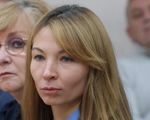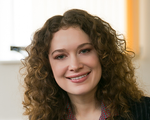About Success Builder
How do you find your place in life? How do you find something to do that both comes naturally to you and makes you happy? The answer is that you have to apply the knowledge you’ve gained from university and from life itself correctly. The Success Builder Project features HSE University graduates who have discovered themselves through an interesting business or an unexpected profession. The protagonists share their experiences and lessons learnt and talk about how they’ve made the most of the opportunities they were given.
Andrey Kucherov became interested in the agro-industrial complex while still a bachelor’s student, choosing this industry as the focus of his final research paper. He is currently the head of the Department for Strategic Communications and Promotion of Agro-Industrial Products at the Agroexport Federal Centre under the Russian Foreign Ministry. In this interview with Success Builder, Mr Kucherov explained why the Social Sciences Faculty is the ideal foundation for a marketing expert, whether civil service work is easy and how Russia will feed Africa.
Why did you choose to pursue a career in sociology?
I first set my sights on HSE because it has good partnerships. It seemed important to me that the university be integrated into the infrastructure of international communications. I looked at international mobility programmes, at the teaching staff and the networking opportunities the university offered. I also studied the ratings and listened to the opinions of older students and friends. HSE had the image of one of the most progressive, interesting and innovative universities. It offers one of the best educations in business and science. When I was preparing to apply, I considered the important fact that the HSE teaching staff included not only luminaries of science, but also practitioners that occupy key roles in companies. The desire to become an HSE student became a psychological challenge, one in which you need to set the bar high and do everything in your power to reach it in order to grow.
I chose sociology because it is interdisciplinary. Like many college applicants, I didn’t know which direction to take when I finished high school. I wanted to take the maximum study load and then decide as I went which area interested me most. Now I understand that it’s not necessary to choose a narrow path early on. For me, going to university is foremost about the people, the diverse environment and the loads of useful information. Because I didn’t take a strictly technical or humanities-based path, the Faculty of Sociology seemed to integrate different disciplines and areas that made a perfect starting point.
I opted to focus on economic sociology after finishing my third year, when I had to choose a specialisation. This field is close to marketing, that I found very impressive at that time because it employed practical tools and methods and its research focused mainly on applied aspects of business. At the same time, I began to see myself in a profession connected with commercial activities or at the intersection of government structures and business.
I liked research, but wasn’t completely ready to take an academic path, although I often thought about getting a PhD. After graduating, many of my sociology classmates went to work at this or that research institute, but I was afraid of being divorced from concrete business practices; I was afraid that I might get bored at some point. That’s why I chose a more hands-on field related to economics and marketing which is widely applicable to real market issues.
You got a master’s degree next. To what extent was that applied knowledge?
Yes, I was looking for a master’s degree with a focus on management and the possibility of integrating into international communication. The HSE Faculty of World Economy and International Affairs came closest to meeting my criteria. The Master of International Business programme was taught in English and the students came from different countries, which is important for developing global thinking and a vision of economic processes. We have a great teaching staff. I would like to give special thanks to Irina Kratko and Professor Ekaterina Entina, my programme head and science advisor, for their exciting lectures and valuable knowledge. I earned a master’s to gain a deeper understanding of business. But I still left some room for academic development, so as much as I could, I worked at HSE laboratories and improved my research skills. This proved useful later, particularly for my teaching work at Moscow State University. Now I’m thinking about returning to the academic path for postgraduate work.
How does a Faculty of Social Sciences background help in business, marketing and management work?
All the disciplines of the social sciences form the basis of marketing. This is an ideal foundation that gives important knowledge in statistics, data analysis and quantitative and qualitative research methods, because there could be no modern marketing without research. Of course, work with data is now highly automated and machine algorithms are advancing. However, traditional methods of data verification – for example, qualitative ones in which we interview or communicate with contractors – remain an important tool. Human communication remains a part of marketing research.
In this way, I gained valuable knowledge in terms of research tools, the correct approach to verifying hypotheses and analysing statistical data, not to mention working with special software. All of this dovetails nicely with an education in marketing. Last year, I also completed the Master in Marketing programme at HSE. The basic analytical tools and various frameworks I had learned at the Faculty of Social Sciences were very useful.
Is marketing about more than just quantitative things, such as understanding social phenomena, even psychology?
No matter how much we would like to explain everything exclusively with numbers and rational approaches, in the market and in life, many phenomena are explained at the place where different disciplines meet. For good research, it’s not enough to conduct a statistical analysis of people’s behaviour and choices as consumers; this is only the first part. It’s important to identify the underlying causes and motives that often reflect emotional factors and insights. You need to understand them to build a competent business strategy, and knowledge of psychology is important in this regard. In the modern world, an interdisciplinary approach is key to having a full understanding of many processes.
What type of research interested you while at the university, and what do you find interesting now?
I did my bachelor’s thesis on food security. This was my basic introduction to the agricultural industry. It was this thesis that led me to my current field. I was also very interested in studying international trade processes. To improve my academic mobility, I took several short continuing education courses while studying at the Faculty of Social Sciences. I was very impressed by a course on international trade from the Kiel Institute for the World Economy. Those two areas – the agricultural sector and the international economy – are mutually integrated in my current work.
How was your first professional experience with state structures?
As a third-year student at the Faculty of Social Sciences, I began working with the HSE Institute for Statistical Research and Economics of Knowledge headed by First Vice Rector Leonid Gokhberg. As an intern, I participated in various ISSEK studies. My first project was to develop the Strategy for Scientific and Technological Development of the Russian Agroindustrial Complex until 2030, that was commissioned by the Ministry of Agriculture. After earning my degree, this was a very logical way to immerse myself in agriculture directly. When the project ended, my mentors at ISSEK explained the prospects for how the agro-industrial complex could develop and my desire to stay in the field grew even stronger. At that time, the project for the Ministry of Agriculture was supervised by Alexander Chulok, director of the ISSEK Center for Scientific and Technological Forecasting, who shared a great deal of knowledge and experience with me.
At the same time, I was invited to enter the civil service in the Ministry of Agriculture. I accepted, although many friends and colleagues were very surprised. First of all, this was a challenge for me because I was going to work as an assistant to the the Deputy Minister. For someone who had only recently been a student, this was an impressive leap upwards. Of course, it would be hard to call this an ideal job in terms of the optimisation of processes and bureaucratic procedures. However, the civil service taught me incredible discipline, the ability to value time and to communicate with very different people.
You have to take responsibility for many decisions, and this really strengthens you as a specialist. What’s more, the Ministry is a good environment for learning to understand the root causes of our socio-economic realities. I also liked the interactive aspect of this work because you constantly encounter different opinions and expand your views on different things.
Communications and networking were another thing that attracted me to working for the state. With enough desire and professionalism, you can meet with lots of interesting people and major decision-makers. I am grateful for this work experience: for a new graduate, it was invaluable and excellent professional training.
I still remember my first day on the job when they gave me a giant stack of documents with the words ‘Work papers for Kucherov’ written on it – and that’s it
In civil service work, you’re not supposed to go to your boss and ask, ‘What should I do about this?’ You have to figure it out yourself, using your own ingenuity and professional knowledge, and not just working documents. This makes you a lot more savvy.
As for optimising processes, government agencies are really working hard to reduce bureaucracy. These are very large and complex organisations and systems and administrative procedures complicate the implementation of many projects. Of course, many areas need new approaches and people who are open to innovation.
Why did you decide to build your career there, despite the difficulties?
While I was working at the Ministry of Agriculture, I was invited to go to work in consulting, at KPMG, in agricultural practice. That was when the federal Export of Agricultural Products project was just coming into existence and there was an understanding that a separate federal structure would be created, subordinate to the Ministry of Agriculture, that would be engaged in the development of agricultural exports. The federal project aims to increase not only the volume of Russia’s agricultural exports, but also their value, which is important for stimulating market participants. After all, to achieve this goal, you need to not only sell a lot, but also to improve the quality of the products sold and the demand for them.
I was invited to head marketing and communications at the Agroexport Federal Centre and I couldn’t say no because the job is an ideal combination of the areas I focused on at the university. What’s more, because Agroexport remains part of the Ministry, it’s possible to interact with state structures and with business. This is a very important function and one of the Centre’s main tasks, to build bridges between officials and our large agricultural producers, industry associations and so on. The organisation’s leadership is very professional and progressive. We’ve built up a unique team and the corporate environment inspires us to constantly develop and improve.
Thus, the Federal Project calls for the volume of Russian agricultural exports to reach $47 billion by 2030. This figure stood at $37 billion in 2021.
How else is Agroexport useful to the market?
We have several lines of work. One of our key tasks is to serve as a kind of think tank by providing expert and analytical support to the Ministry of Agriculture in its policy of developing agricultural exports. Agroexport expertise is used in developing measures for state support, in forming the state’s position in international negotiations and in the discussion on approaches to the promotion of Russian products in foreign markets.
We work very closely with businesses, industry unions and business associations, creating analytical products needed by the market that help manufacturers enter new markets and develop there. In a sense, Agroexport actually forms a new system of knowledge and competencies in the field of agricultural exports.
We also promote domestic products abroad, marketing them at the state level. There is a wide range of exported goods: commodities as well as processed and finished products. For this reason, we create promotional strategies tailored to each product group and market.
How does Agroexport work with local producers?
We work with them indirectly by supporting individual sub-sectors and promoting groups of products. If you look at how our exports are structured, the largest share in terms of volume and value is commodities: grain, fat and oil products and meat and fish products. Of course, we work with more highly processed products as well.
I head the Department of Strategic Communications and Promotion of Agricultural Products. In addition to implementing the institution’s communication policy, we work in several areas. The first project is the development of export guides. This is an expert-analytical product with a methodology based on ‘product-country’ pairs such as ‘poultry meat – China’ or ‘chocolate products – UAE’. We call this a ‘country guide’. The document contains all the basic information required to start or develop exports to a specific market.
This is a globally recogised instrument. For example, the United States Department of Agriculture (USDA) or the Irish Export Development Agency (Bord Bia) also produce such export guides with which an exporter that is planning to enter a certain market with its products can find answers to questions about market conditions, consumer preferences, intellectual property protection information, tariff or non-tariff regulation, etc.
We are producing the guides in cooperation with the World Bank because it has offices in many countries, and this enables us to cooperate with colleagues in data collection. To date, we have developed more than 80 such guides.
The second project is the creation of ‘route to market’ strategies for whole sub-industries. To do this, we are creating an interdisciplinary working group that includes officials, businesses, international consultants such as KPMG, PwC and other colleagues, and various major international marketing agencies. The work consists of developing a business model for market penetration and a marketing strategy for product promotion.
The third project is the organisation of various events for our companies. In particular, we conduct business missions, organise participation in international exhibitions and hold expert and educational events. This is one of the main sets of tools for promotion in a particular market. We conduct training seminars for Russian exporters as well as various business sessions at major federal forums with Russia or at international venues.
What is the main issue that Agroexport is trying to address?
Every part of foreign economic activity has it own considerations and challenges. In marketing, a key issue is the lack of consolidation or a unified country-level approach to promoting products abroad. Many companies start competing with each other in foreign markets. As a result, foreign firms see us as being not as large as we would like. When you enter a foreign market with a united front – promoting, for example, a single sub-brand such as ‘Russian milk’ or ‘sweets from Russia’ that is led by a state structure – the pool of key companies is promoted in a coordinated way, which creates a completely different impression.
We train Russian companies methodologically and explain the rules of the game to them. In some cases we argue for a certain position and in others we reach agreement because it is more effective to carry out expansion together. This isn’t easy because companies are not always willing to reach agreement on, for example, how the common brand for their products will look, in which territories they should position themselves, the right way to build a marketing strategy, how to combine values, goals, etc. This gets into the zone of communication and decision-making that we work out with key players. We also research everything thoroughly.
Who is the world leader in the consumption of Russian products?
As of last year, it was the European Union. China led before the pandemic, but is now in third place. Turkey is in second place, South Korea in fourth and Egypt in fifth. At the level of regions, one of the most important for us is the Asian and and Middle Eastern markets – the Philippines, Vietnam, Indonesia, Pakistan, the Persian Gulf states, the UAE, Saudi Arabia, Qatar, Bahrain and, paradoxically, Africa. The African region has consistently shown high rates of population and GDP growth, so Africa will become a huge area for us to develop agricultural exports in the future.
How do technologies and innovations find their way into the conservative agro-industrial complex?
The industry could hardly be called conservative; it is developing rapidly and, happily, becoming increasingly attractive to young professionals. For our economy, the long-forgotten agricultural industry is making a comeback. In 2020, it made up 4% of our country’s GDP and employed 4.6 million people. And by the way, a few years ago, the export of agricultural exports exceeded arms exports. Exports more than doubled between 2015 and 2021 and Russia, which has strong growth, is one of the 20 largest agricultural exporters in the world. It could become one of the Top 10 in coming years. Russian farmers sell their products to more than 160 countries of the world. The agricultural industry needs young personnel and will do everything it can to attract and train specialists – with the participation of Agroexport, among others.
Export is generally about meeting the standards and values that different markets impose, and if you respond effectively and competently, you will be successful
The industry has a lot of potential for innovation in digitalisation. In particular, working with big data in large holdings is one of the main components of business. For example, it is impossible to transfer data from the fields for direct processing without the help of figures and data specialists.
Also, one key area is the use of digital technologies to create traceability systems for our products because the consumer in the post-COVID era looks primarily at product safety. Digital technologies are also used to certify foods as ‘halal’, ‘kosher’ or ‘organic’. You won’t be able to ship your products to certain countries whose regulations call for specific certifications. Thus, the transition to digital is one of the key components in terms of production efficiency and compliance with the requirements of foreign markets.














































































































































